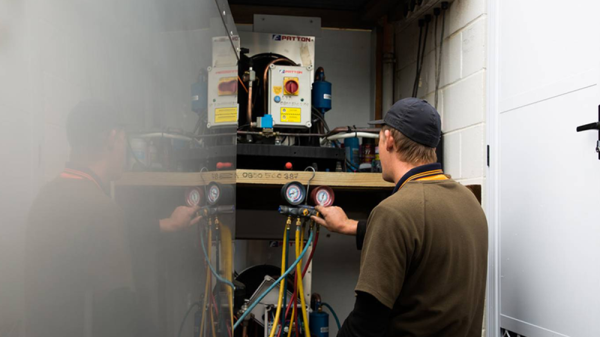Proactive care of refrigerant gas can save big dollars: DTS
The rapid increase in the New Zealand carbon unit price (NZU) can have a big effect on dairy farmers as New Zealand pursues its domestic and international climate change targets.
That increase has seen the widespread and controversial conversion of sheep and beef land into permanent exotic forests – but it has also raised the blood pressure of many dairy farmers who say the NZU is responsible for an increase of over 1000 per cent in the price of some refrigerant gases used in cooling milk on-farm over the last five years.
The NZU, part of the government's Emissions Trading Scheme (ETS), has shot up as companies have sought to offset their greenhouse gas emissions by investing in forests planted purely for carbon production.
All synthetic gas refrigerants which absorb heat have, as a result, risen in price depending on their global warming potential, with one of the most popular and best-performing going up by a whopping 1066 per cent since 2007.
So dairy farmers, on top of a range of other recent cost increases, can find it very expensive if they need to replace refrigerants due to any maintenance problems or leaks.
With the swathe of rules and regulations they now face, it's easy to overlook some of the basics – such as routine maintenance of plant before they shut down in autumn, once the herd is dried off.
That can have potentially catastrophic results later on, particularly at busy times when stress levels are high, such as at calving. Essential pre-cooling and refrigeration plant in milking sheds get a tough workout for most of the year – and can suddenly fail without that maintenance.
That means milk isn't chilled to the correct temperature and can't be collected by the dairy company.
Ben Lagan, Taranaki area sales manager with DTS, a leading manufacturer of stainless steel milk vats and cooling equipment, has seen what can happen up close.
"Farmers are putting the milk in the vat and we're keeping it chilled," he says. In one recent case a check of a farmer's refrigeration unit found a drier was rusting out, due to a combination of wear and tear and the farm being in a coastal area.
"It hadn't yet given the farmer any grief," he says. But if an annual check hadn't found the problem that could have meant re-gassing the unit at a cost of around $5000, not to mention the potential milk loss on top of that.
"A lot of farmers do become complacent," Lagan says. "They'll call you when it's too late."
In another case, the solenoid coil in a refrigeration unit had deteriorated without the farmer being aware, making him grateful it was discovered during his unit's annual check – and before it failed.
Find out more about Service-Man
The cost of re-gassing depends on the size of the refrigeration unit; also at risk is over $7000 of income if the milk in a 9100 litre tank is rejected because it's too warm to be picked up. Added to that is the environmental effects of undetected gas leaks.
Over the last 12 months DTS, which has been in operation for over 40 years, has performed close to 7000 on-farm services reacting to problems at a cost of up to $8000 each. The peak times of year for these call-outs are right when farmers are at their busiest – calving in spring and in January when temperatures are heating up and attending to plant problems has been put off until after Christmas.
So there can be delays in getting problems attended to because of high demand, says Lagan – avoided by being proactive.

A technician services a DTS Ice Bank.
He sells DTS's Service-Man annual check of farm refrigeration and pre-cooling equipment, which the company has offered for the past two years, comparing it to the regular servicing farmers plan for their car and tractor.
"They only need to allow half an hour to an hour for it to be carried out and they don't need to be there," he says.
For $350 plus GST for a single unit and another $150 for a further unit, a comprehensive 35-point service check of equipment is undertaken by approved and qualified service technicians. The cost includes labour and mileage and farmers are able to pay by direct debit.
They receive a detailed report, including recommendations of any remedial action needed for equipment to perform to the manufacturer's standards. As well as a 5 per cent discount on all non-scheduled DTS call-outs, farmers on the plan also receive discount on the company's range of products, services, and hardware – including drafting gates.
"Most farmers are pretty open to it," Lagan says. "They understand they need it for their peace of mind. It's definitely worthwhile."


